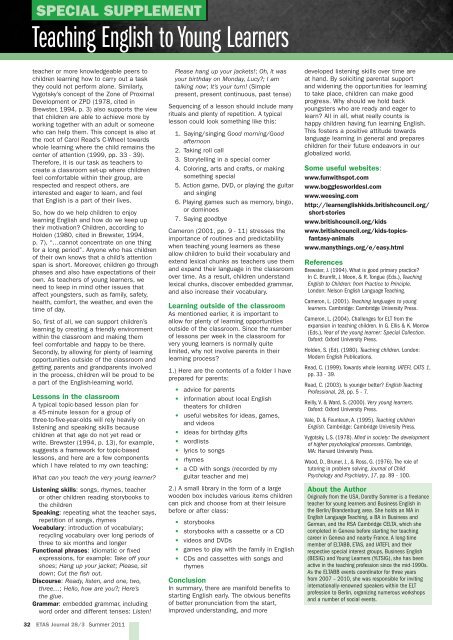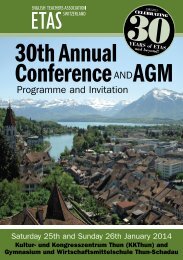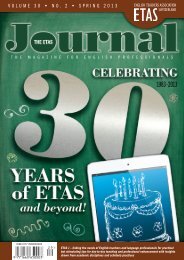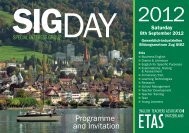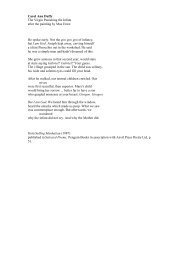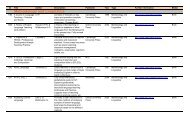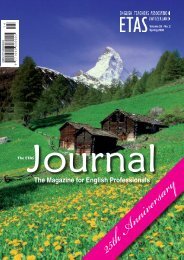Teaching English to Young Learners - English Teachers Association ...
Teaching English to Young Learners - English Teachers Association ...
Teaching English to Young Learners - English Teachers Association ...
Create successful ePaper yourself
Turn your PDF publications into a flip-book with our unique Google optimized e-Paper software.
SPECIAL SUPPLEMENT<br />
<strong>Teaching</strong> <strong>English</strong> <strong>to</strong> <strong>Young</strong> <strong>Learners</strong><br />
teacher or more knowledgeable peers <strong>to</strong><br />
children learning how <strong>to</strong> carry out a task<br />
they could not perform alone. Similarly,<br />
Vygotsky’s concept of the Zone of Proximal<br />
Development or ZPD (1978, cited in<br />
Brewster, 1994, p. 3) also supports the view<br />
that children are able <strong>to</strong> achieve more by<br />
working <strong>to</strong>gether with an adult or someone<br />
who can help them. This concept is also at<br />
the root of Carol Read’s C-Wheel <strong>to</strong>wards<br />
whole learning where the child remains the<br />
center of attention (1999, pp. 33 - 39).<br />
Therefore, it is our task as teachers <strong>to</strong><br />
create a classroom set-up where children<br />
feel comfortable within their group, are<br />
respected and respect others, are<br />
interested and eager <strong>to</strong> learn, and feel<br />
that <strong>English</strong> is a part of their lives.<br />
So, how do we help children <strong>to</strong> enjoy<br />
learning <strong>English</strong> and how do we keep up<br />
their motivation? Children, according <strong>to</strong><br />
Holden (1980, cited in Brewster, 1994,<br />
p. 7), “…cannot concentrate on one thing<br />
for a long period”. Anyone who has children<br />
of their own knows that a child’s attention<br />
span is short. Moreover, children go through<br />
phases and also have expectations of their<br />
own. As teachers of young learners, we<br />
need <strong>to</strong> keep in mind other issues that<br />
affect youngsters, such as family, safety,<br />
health, comfort, the weather, and even the<br />
time of day.<br />
So, first of all, we can support children’s<br />
learning by creating a friendly environment<br />
within the classroom and making them<br />
feel comfortable and happy <strong>to</strong> be there.<br />
Secondly, by allowing for plenty of learning<br />
opportunities outside of the classroom and<br />
getting parents and grandparents involved<br />
in the process, children will be proud <strong>to</strong> be<br />
a part of the <strong>English</strong>-learning world.<br />
Lessons in the classroom<br />
A typical <strong>to</strong>pic-based lesson plan for<br />
a 45-minute lesson for a group of<br />
three-<strong>to</strong>-five-year-olds will rely heavily on<br />
listening and speaking skills because<br />
children at that age do not yet read or<br />
write. Brewster (1994, p. 13), for example,<br />
suggests a framework for <strong>to</strong>pic-based<br />
lessons, and here are a few components<br />
which I have related <strong>to</strong> my own teaching:<br />
What can you teach the very young learner?<br />
Listening skills: songs, rhymes, teacher<br />
or other children reading s<strong>to</strong>rybooks <strong>to</strong><br />
the children<br />
Speaking: repeating what the teacher says,<br />
repetition of songs, rhymes<br />
Vocabulary: introduction of vocabulary;<br />
recycling vocabulary over long periods of<br />
three <strong>to</strong> six months and longer<br />
Functional phrases: idiomatic or fixed<br />
expressions, for example: Take off your<br />
shoes; Hang up your jacket; Please, sit<br />
down; Cut the fish out.<br />
Discourse: Ready, listen, and one, two,<br />
three…; Hello, how are you?; Here’s<br />
the glue.<br />
Grammar: embedded grammar, including<br />
word order and different tenses: Listen!<br />
32 ETAS Journal 28/3 Summer 2011<br />
Please hang up your jackets!; Oh, it was<br />
your birthday on Monday, Lucy?; I am<br />
talking now; It’s your turn! (Simple<br />
present, present continuous, past tense)<br />
Sequencing of a lesson should include many<br />
rituals and plenty of repetition. A typical<br />
lesson could look something like this:<br />
1. Saying/singing Good morning/Good<br />
afternoon<br />
2. Taking roll call<br />
3. S<strong>to</strong>rytelling in a special corner<br />
4. Coloring, arts and crafts, or making<br />
something special<br />
5. Action game, DVD, or playing the guitar<br />
and singing<br />
6. Playing games such as memory, bingo,<br />
or dominoes<br />
7. Saying goodbye<br />
Cameron (2001, pp. 9 - 11) stresses the<br />
importance of routines and predictability<br />
when teaching young learners as these<br />
allow children <strong>to</strong> build their vocabulary and<br />
extend lexical chunks as teachers use them<br />
and expand their language in the classroom<br />
over time. As a result, children understand<br />
lexical chunks, discover embedded grammar,<br />
and also increase their vocabulary.<br />
Learning outside of the classroom<br />
As mentioned earlier, it is important <strong>to</strong><br />
allow for plenty of learning opportunities<br />
outside of the classroom. Since the number<br />
of lessons per week in the classroom for<br />
very young learners is normally quite<br />
limited, why not involve parents in their<br />
learning process?<br />
1.) Here are the contents of a folder I have<br />
prepared for parents:<br />
• advice for parents<br />
• information about local <strong>English</strong><br />
theaters for children<br />
• useful websites for ideas, games,<br />
and videos<br />
• ideas for birthday gifts<br />
• wordlists<br />
• lyrics <strong>to</strong> songs<br />
• rhymes<br />
• a CD with songs (recorded by my<br />
guitar teacher and me)<br />
2.) A small library in the form of a large<br />
wooden box includes various items children<br />
can pick and choose from at their leisure<br />
before or after class:<br />
• s<strong>to</strong>rybooks<br />
• s<strong>to</strong>rybooks with a cassette or a CD<br />
• videos and DVDs<br />
• games <strong>to</strong> play with the family in <strong>English</strong><br />
• CDs and cassettes with songs and<br />
rhymes<br />
Conclusion<br />
In summary, there are manifold benefits <strong>to</strong><br />
starting <strong>English</strong> early. The obvious benefits<br />
of better pronunciation from the start,<br />
improved understanding, and more<br />
developed listening skills over time are<br />
at hand. By soliciting parental support<br />
and widening the opportunities for learning<br />
<strong>to</strong> take place, children can make good<br />
progress. Why should we hold back<br />
youngsters who are ready and eager <strong>to</strong><br />
learn? All in all, what really counts is<br />
happy children having fun learning <strong>English</strong>.<br />
This fosters a positive attitude <strong>to</strong>wards<br />
language learning in general and prepares<br />
children for their future endeavors in our<br />
globalized world.<br />
Some useful websites:<br />
www.funwithspot.com<br />
www.bogglesworldesl.com<br />
www.weesing.com<br />
http://learnenglishkids.britishcouncil.org/<br />
short-s<strong>to</strong>ries<br />
www.britishcouncil.org/kids<br />
www.britishcouncil.org/kids-<strong>to</strong>picsfantasy-animals<br />
www.manythings.org/e/easy.html<br />
References<br />
Brewster, J. (1994). What is good primary practice?<br />
In C. Brumfit, J. Moon, & R. Tongue (Eds.), <strong>Teaching</strong><br />
<strong>English</strong> <strong>to</strong> Children: from Practice <strong>to</strong> Principle.<br />
London: Nelson <strong>English</strong> Language <strong>Teaching</strong>.<br />
Cameron, L. (2001). <strong>Teaching</strong> languages <strong>to</strong> young<br />
learners. Cambridge: Cambridge University Press.<br />
Cameron, L. (2004). Challenges for ELT from the<br />
expansion in teaching children. In G. Ellis & K. Morrow<br />
(Eds.), Year of the young learner: Special Collection.<br />
Oxford: Oxford University Press.<br />
Holden, S. (Ed). (1980). <strong>Teaching</strong> children. London:<br />
Modern <strong>English</strong> Publications.<br />
Read, C. (1999). Towards whole learning. IATEFL CATS 1,<br />
pp. 33 - 39.<br />
Read, C. (2003). Is younger better? <strong>English</strong> <strong>Teaching</strong><br />
Professional, 28, pp. 5 - 7.<br />
Reilly, V. & Ward, S. (2000). Very young learners.<br />
Oxford: Oxford University Press.<br />
Vale, D. & Feunteun, A. (1995). <strong>Teaching</strong> children<br />
<strong>English</strong>. Cambridge: Cambridge University Press.<br />
Vygotsky, L.S. (1978). Mind in society: The development<br />
of higher psychological processes. Cambridge,<br />
MA: Harvard University Press.<br />
Wood, D., Bruner, J., & Ross, G. (1976). The role of<br />
tu<strong>to</strong>ring in problem solving. Journal of Child<br />
Psychology and Psychiatry, 17, pp. 89 - 100.<br />
About the Author<br />
Originally from the USA, Dorothy Sommer is a freelance<br />
teacher for young learners and Business <strong>English</strong> in<br />
the Berlin/Brandenburg area. She holds an MA in<br />
<strong>English</strong> Language <strong>Teaching</strong>, a BA in Business and<br />
German, and the RSA Cambridge CELTA, which she<br />
completed in Geneva before starting her teaching<br />
career in Geneva and nearby France. A long-time<br />
member of ELTABB, ETAS, and IATEFL and their<br />
respective special interest groups, Business <strong>English</strong><br />
(BESIG) and <strong>Young</strong> <strong>Learners</strong> (YLTSIG), she has been<br />
active in the teaching profession since the mid-1990s.<br />
As the ELTABB events coordina<strong>to</strong>r for three years<br />
from 2007 – 2010, she was responsible for inviting<br />
internationally-renowned speakers within the ELT<br />
profession <strong>to</strong> Berlin, organizing numerous workshops<br />
and a number of social events.


